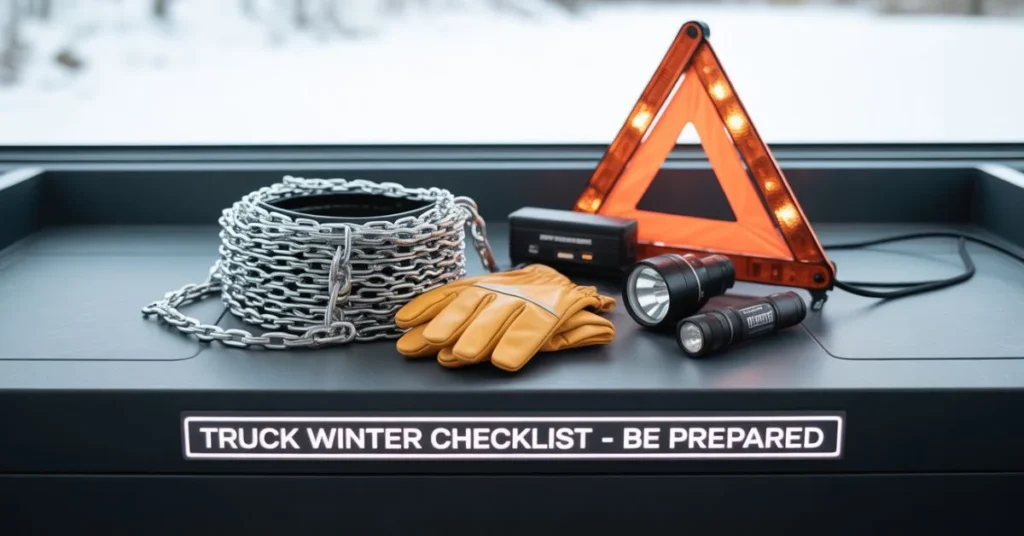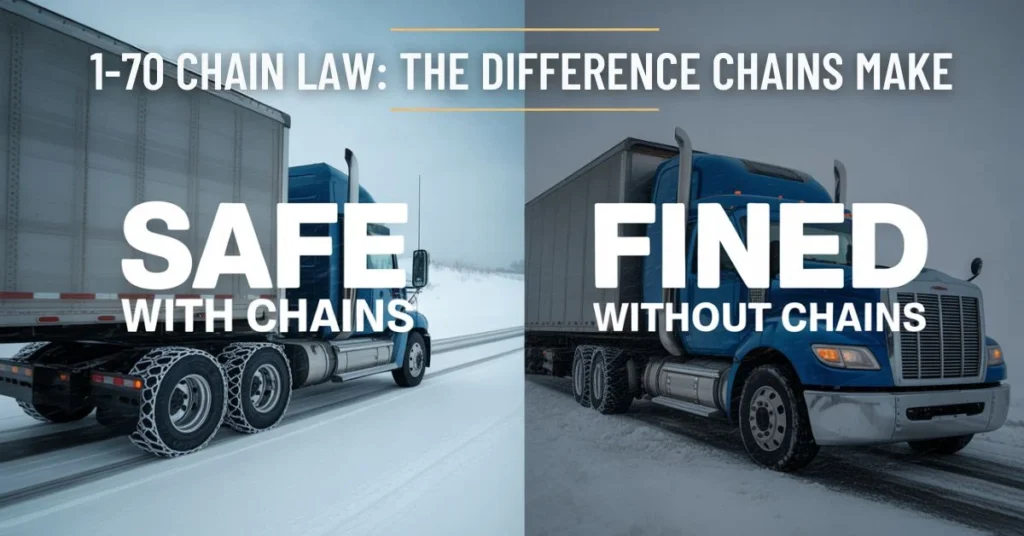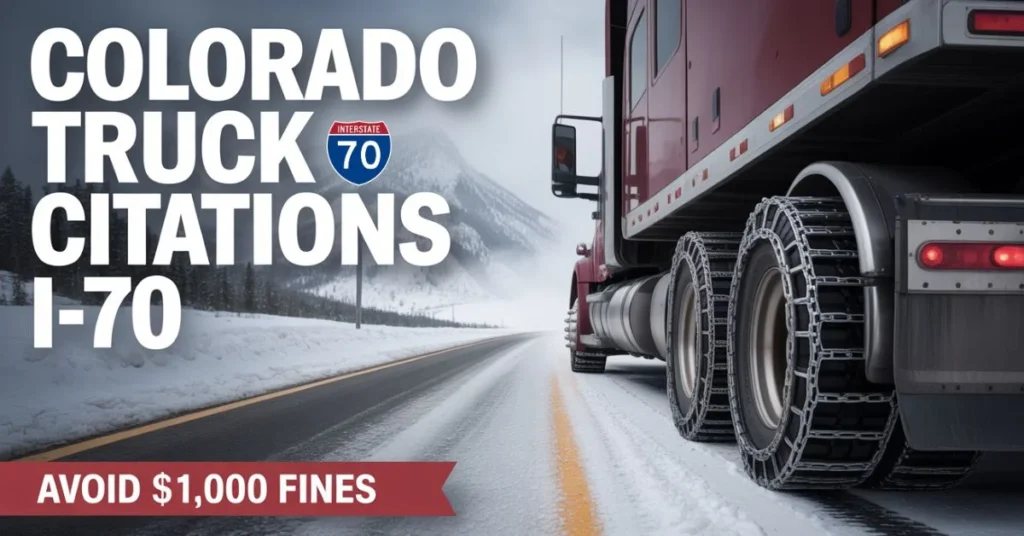Table of Contents
Interstate 70 is more than just a highway in Colorado; it’s a vital commercial artery that winds through the heart of the Rocky Mountains. For truckers, it’s a critical route for transporting goods across the country. Winter on I-70 is no joke—steep grades and heavy snow often lead to Colorado truck citations I-70 chain violations. Knowing the law can save you fines and downtime. However, during the winter, this scenic highway becomes one of the most hazardous roads in the nation.
Steep grades, sharp curves, and heavy snowfall create treacherous conditions that can quickly lead to accidents and closures. For commercial drivers, navigating this stretch requires skill, preparation, and strict adherence to state laws. Unfortunately, many drivers learn this the hard way, facing significant Colorado Truck Citations that come with hefty fines and costly delays. For truckers running older rigs, unexpected breakdowns on steep grades can make matters worse—this is why many rely on affordable used engines and used transmissions to keep their vehicles road-ready.” What Causes Colorado Truck Citations on I-70?
Navigating I-70 in winter is a challenge, and a single mistake can lead to serious consequences. Authorities are vigilant about enforcement to prevent accidents and keep traffic moving. Here are the primary reasons truckers receive citations on this route.
I-70 Chain Law Requirements by Vehicle Type
Understanding which requirements apply to your specific vehicle is crucial for compliance. Here’s a breakdown:
| Vehicle Type | Chain Requirement | Alternative Traction Devices | Weight Requirement |
| Single Unit Trucks (over 26,000 lbs) | Chains on at least one drive axle | Approved AutoSock, cables | Must carry chains regardless |
| Tractor-Trailers | Chains on at least one drive axle | Approved alternatives acceptable | Mandatory chain carrying |
| Commercial Buses | All-season tires minimum | AutoSock or chains | Weather-dependent |
| Light Commercial (under 26,000 lbs) | 4WD/AWD with 3/16″ tread OR chains | Snow tires, cables | Seasonal requirement |
Colorado I-70 Chain Law – What Drivers Need to Know
Colorado chain law is one of the strictest in the country. If you operate a commercial vehicle on the I-70 mountain corridor, you must know these rules inside and out.
- Enforcement Period: The law is in effect from September 1 to May 31 each year. While it is enforced when conditions require it, commercial vehicles must carry chains throughout this entire period.
- Vehicle Requirements: The Colorado chain law applies to all commercial vehicles with a Gross Vehicle Weight Rating (GVWR) of 26,001 pounds or more.
- Chain-Up Stations: The Colorado Department of Transportation (CDOT) has designated chain-up and chain-down stations along I-70. These are the only places where it is safe and legal to install or remove your chains. Stopping in a live lane of traffic to put on chains will result in a major fine.
Knowing when and how to chain up is crucial. CDOT provides real-time updates on its website and mobile apps, so drivers should always check conditions before heading into the mountains.
Critical Enforcement Zones on I-70
Colorado State Patrol focuses enforcement on these key I-70 segments:
- Morrison to Georgetown (Mile markers 259-228)
- Silverthorne to Vail Pass (Mile markers 205-190)
- Glenwood Canyon (Mile markers 133-119)
- Grand Junction approaches (Mile markers 49-26)
When Chain Laws Are Enforced
Colorado chain law activation depends on specific weather conditions, not just the calendar. Here’s when you must comply:
Automatic Enforcement Triggers
- Snowfall accumulation of 1 inch or more
- Ice formation on roadways
- Visibility reduced to less than 1/4 mile
- Wind speeds exceeding 35 mph with precipitation
Seasonal Considerations
- Peak Enforcement: November through March
- Shoulder Seasons: September-October, April-May (weather dependent)
- Summer Months: Rare but possible during severe weather events
Penalties for Colorado Truck Citations on I-70
Ignoring the Colorado chain law can be an expensive mistake. The penalties are designed to be a strong deterrent, reflecting the serious risks involved.
- Fine for Not Carrying Chains: If you are caught without the required chains between September 1 and May 31, you can face a fine of $500 plus a surcharge.
- Fine for Blocking the Highway: If your truck blocks any part of the highway because you failed to use chains, the fine skyrockets to $1,000 plus a surcharge.
- Costly Delays: Beyond the fines, getting stuck or causing a closure leads to significant downtime. These delays can cost trucking companies thousands of dollars in lost revenue, missed deadlines, and recovery expenses.
Ignoring the Colorado truck citations I-70 chain law can cost truckers $500–$1,000 in fines, plus delays that hurt delivery schedules. With fines reaching thousands of dollars, avoiding unnecessary costs becomes even more critical—especially with today’s trucking industry driver shortage adding pressure on fleets.
Fine Structure
| Violation Type | First Offense | Repeat Offense | Court Costs |
| Failure to carry chains | $650 | $1,000+ | $200+ |
| Improper chain installation | $500 | $750+ | $200+ |
| Blocking traffic due to traction issues | $1,200+ | $2,000+ | $300+ |
| Commercial vehicle violations | Add 50% to base fine | Double penalties | Additional fees |
Legal Consequences
- CDL Points: Chain law violations typically add 3-4 points
- DOT Record Impact: Violations appear on your safety record
- Insurance Effects: Multiple violations can increase commercial insurance rates
- Employment Impact: Some carriers have zero-tolerance policies

How to Install Tire Chains on a Truck (I-70 Colorado chain law Compliant)
What You’ll Need:
- Tire chains (appropriate size for your truck’s tires)
- Gloves (to protect your hands from cold and sharp edges)
- Flashlight (if visibility is low)
- A safe, flat area (preferably a designated chain-up station)
Step-by-Step Installation Process:
1. Park Safely:
- Pull over at a designated chain-up station along I-70. Avoid stopping in a live traffic lane, as this is both dangerous and illegal.
2. Lay Out the Chains:
- Unroll the chains and lay them flat on the ground. Ensure there are no twists or tangles.
- Position the chains so the hooks face outward (away from the tire) to prevent damage to the tire sidewall.
3. Position the Chains:
- Drape the chains over the top of the tire, ensuring they are evenly distributed. The chains should cover the tire tread and hang down the sides.
4. Connect the Chains:
- Start by fastening the inside hooks or clips first, then move to the outside. This ensures the chains are secure and won’t slip off.
- Tighten the chains as much as possible to prevent them from loosening during travel.
5. Drive Forward Slightly:
- Move the truck forward a few feet to expose the part of the tire that was on the ground. Adjust and secure the chains to ensure full coverage.
6. Tighten Again:
- Use a chain tensioner or bungee cords to keep the chains snug against the tire. Loose chains can cause damage or fall off while driving.
7. Test the Chains:
- Drive a short distance (at low speed) to ensure the chains are properly installed and not making excessive noise or causing vibrations.
Drivers should also carry essential car components and tools to handle breakdowns or roadside emergencies during winter
Pro Tips for Easy Installation:
- Practice Before Winter: Familiarize yourself with the process in good weather to avoid stress during a storm.
- Carry Extras: Keep spare chains and tensioners in case of breakage. And don’t forget—if your truck is consistently struggling to pull grades, it may be time for a dependable Ford F-250 Super Duty engine or 6R140 transmission
- Check Fit: Ensure the chains are the correct size for your tires before heading out.
- Stay Updated: Monitor CDOT road conditions for Colorado chain law enforcement updates.
When to Remove Chains:
- Only remove chains at designated chain-down stations once you’ve cleared the hazardous area. Driving on bare pavement with chains can damage both the chains and your tires.
Always monitor weather conditions closely before embarking on the I-70 drive—and make sure your truck is mechanically prepared. Whether it’s an engine upgrade or a transmission replacement, proper prep can make the difference between a smooth haul and a roadside breakdown.
| Traction Device | Description | Advantages | Considerations |
| Tire Chains | Metal chains fitted around tires to increase traction on snow and ice. | Exceptional grip on thick snow or ice. Durable and reusable. | Requires proper installation, can be noisy. |
| Snow Socks | Textile-based sleeve that fits over the tire, enhancing grip on slippery surfaces. | Lightweight, easy to store, and quick to install. | Less durable, limited use on ice. |
| Studded Tires | Tires with embedded metal studs designed for icy conditions. | Superior traction on icy roads. | Not street legal in some areas; causes road wear. |
| Sand or Traction Mats | Portable mats placed under tires to gain traction, especially on snow or loose surfaces. | Easy to use, affordable, and reusable. | Only effective in stuck situations. |
| Automatic Tire Chains | Motorized systems that deploy chains under tires at the push of a button. | Convenient and instantaneous. | Expensive; requires professional installation. |

Best Routes and Key Checkpoints on I-70
To ensure a safe and efficient drive along I-70, especially during winter or adverse weather conditions, understanding the best routes, checkpoints, and timings is essential. Below is a table summarizing important details drivers should know:
| Section/Route | Key Checkpoints | Details | Opening/Closing Times |
| Denver to Georgetown | Idaho Springs, Floyd Hill | Heavy traffic during peak hours; steep inclines near Floyd Hill. | Open year-round, but delays common in winter storms. |
| Georgetown to Eisenhower Tunnel | Silver Plume, Loveland Pass Turnoff | High elevation; Eisenhower Tunnel may close during hazardous weather. | Tunnel may close temporarily during heavy snow or emergencies. |
| Eisenhower Tunnel to Frisco | Dillon, Silverthorne | Be cautious of icy roads; breathtaking views of Lake Dillon. | Rare closures, but check CDOT updates in winter road advisories. |
| Frisco to Vail | Copper Mountain, Vail Pass Rest Area | Steep descents; Vail Pass often requires chains or snow tires in winter. | Chain law often enforced; check Vail Pass status in winter. |
| Vail to Glenwood Springs | Avon, Eagle, Gypsum | Relatively easier drive; stunning views through Glenwood Canyon. | Glenwood Canyon may close due to rockfalls or weather conditions. |
Additional Important Notes for Drivers:
- Chain Law Enforcement: Colorado chain law are usually active from late September to May, especially near mountainous passes. Stay updated through CDOT.
- Rest Areas: Utilize rest areas like Vail Pass Rest Area and Silverthorne for breaks and safety.
- Weather Monitoring: Always monitor weather conditions closely before embarking on the I-70 drive. Sudden changes in weather can occur, especially in higher elevations.
The best way to prevent Colorado truck citations I-70 chain violations is to prepare early—carry the right chains, know enforcement zones, and check CDOT updates. Drivers are encouraged to check CDOT’s website or mobile app for the latest updates on road conditions, closures, and chain requirements.
If a dead battery stalls your trip, knowing how to jump start a car can get you moving again without costly delays.

Conclusion
Colorado chain laws exist to protect everyone on the road during dangerous winter conditions. While the requirements might seem complex, compliance is straightforward when you understand the rules and prepare properly.
The key is preparation: carry proper traction devices, know how to install them, monitor weather conditions, and don’t take chances with safety. The cost of compliance is minimal compared to the potential expenses of citations, accidents, or getting stranded in mountain weather.
Remember, these laws aren’t just about avoiding fines—they’re about getting home safely and keeping Colorado’s mountain highways open for everyone. When you’re properly prepared, you’re not just protecting yourself; you’re helping ensure the entire transportation system works safely and efficiently.
Frequently Asked Questions
-
When is the I-70 chain law enforced?
From September 1 through May 31, especially during snowstorms.
-
Do light trucks or cars need chains?
Mostly applies to commercial vehicles over 26,000 lbs, but 4WD passenger vehicles may need snow tires.
-
How much is the fine for ignoring the chain law?
Fines range from $500 to $1,000+.
-
Can chains damage my truck?
Not if installed properly—chains are designed to protect both the truck and road safety.
-
What if my truck keeps breaking down in winter?
It may be time for a replacement engine or transmission to handle tough conditions



